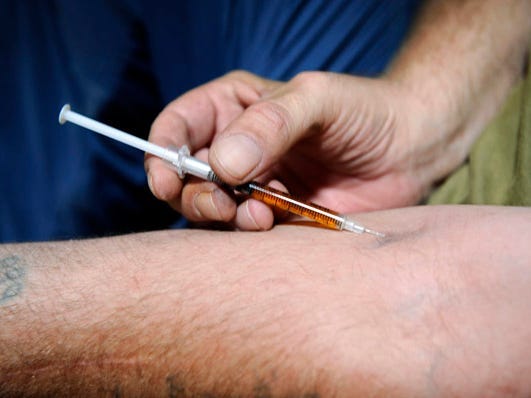Global Courant 2023-05-13 17:45:00
A man in a camouflage uniform walks out of the headquarters of the Wagner Group, a Russian mercenary organization, in St. Petersburg, Russia.Igor Russak/File Photo/Reuters
Ukrainian soldiers have questioned whether Russians advancing on Bakhmut are using drugs.
No evidence has emerged that Russia is giving drugs to soldiers.
But performance-enhancing drug use has been widespread among troops from various nations since at least World War I.
Ukrainian soldiers recently I wondered aloud whether Russians who fought for the country’s mercenary Wagner troops in the important city of Bakhmut took drugs while on their way to “certain death”, according to The New York Times.
No evidence has emerged that Russia or the Wagner Group are supplying drugs to their troops. But it wouldn’t be a surprise. Performance-enhancing drug use among soldiers has been commonplace throughout history.
British shops sold syringes of heroin as gifts to send to troops during the First World War
AP photo
During World War I, British department stores – including the famous Harrods – sold “kits” filled with syringes, needles, cocaine and heroin. according to the BBC.
The kits were marketed as gifts to friends and relatives serving at the front to comfort them as they coped with the horrors of war, the outlet said.
Women often bought these kinds of kits and took them to train stations to give to their boyfriends or husbands who were on a shipment, according to Voltefacea London-based advocacy group that promotes policies to reduce the harm caused by drug use.
Harrods also offered small packages of morphine and cocaine “complete with syringe and spare needles,” the advocacy group said.
The Nazis gave meth to their soldiers during World War II to give them a boost
Crystal methamphetamine.REUTERS/Ralph Orlowski/File Photo
Nazi Germany touted methamphetamine as a “wonder drug” when the drug first hit the commercial market in the late 1930s. The excitement was in stark contrast to the Nazi Party’s general view that drugs were viewed as a sign of weakness, according to TIME.
German soldiers who invaded Poland in September 1939 used methamphetamine in the “first real military test” of the drug in the field for the Nazis, according to TIME.
Story continues
The drug would play a major role in the Third Reich. Because it focused on physical and mental superiority, Nazi troops used it for hyper-alertness and vigilance, the outlet reported.
Blitzkrieg, the form of Nazi warfare that consisted of rapid, unexpected, mechanized attacks on enemy forces, was “led by methamphetamine,” historian Peter Steinkamp told the outlet.
While the Nazis were the most avid users of the drug, the Allies also used meth during World War II to increase “confidence and aggression” and “raise morale,” according to a report in The Journal of Interdisciplinary History.
Russia rationed vodka to its soldiers on the front lines during World War II
Getty Images
During World War II, meanwhile, the Russians relied on alcohol to get through the war. Whether it has improved their performance, however, is another matter.
In World War II, the Russian Ministry of Defense gave every soldier on the front line a ration of 100 grams of vodka – which was called the “commissar’s ration”. The policy was widely criticized in the country, especially by doctors.
In a report published by the Department of Russian Studies on Macalester CollegeVodka has been a “featured player” in the Russian military since the late 19th century.
Many historians attribute Russia’s defeat in the Russo-Japanese War of 1904-1905 to the use of vodka among the Russian troops, which lowered morale and impaired their capabilities to such an extent that the army was instead deployed by the end of the war beer and wine began to be handed out, according to the report.
The US military gave troops speed and painkillers during the Vietnam War
A stock photo of white pills.Xvision/Getty Images
The U.S. military handed out painkillers and “pep pills” to soldiers en route for long-range reconnaissance missions and ambushes, according to The Atlantic Ocean.
The military gave 20 milligrams of dextroamphetamine to soldiers for 48 hours of combat readiness, but the men rarely followed recommended doses, according to the report.
A 1971 report by the House Select Committee on Crime found that troops had used 225 million stimulant tablets between 1966 and 1969.
According to The Atlantic, the stimulants used by US troops during the Vietnam War were nearly twice as strong as the amphetamines used during World War II.
Drug use in general among US troops skyrocketed during the Vietnam War. Soldiers used marijuana, psychedelics like LSD and mushrooms, and even hard drugs like cocaine and heroin, according to History. com.
A 1971 Department of Defense report indicated that 51% of US armed forces had smoked marijuana, the outlet said.
The US allows Indians in the military to use peyote
A peyote cactus.Federica Grassi/Getty Images
While not an example of performance-enhancing drug use, it’s worth noting that the US military allows restricted drug use for religious reasons.
Starting in 1997, the US military allowed Native American troops to use peyote, a psychoactive plant that can cause hallucinations, according to The Associated Press.
Peyote is considered sacred by many Native American tribes and is used during religious services. The military only allowed Native American troops to use the drug for religious services.
“If they use peyote in their religious practice, it is a sacrament, not a drug, just as sacramental wine is not considered a drug,” a Pentagon spokesman told the AP at the time.
In 2020, the Ministry of Defense changed the decision. It still allows Indigenous troops to use the drug as part of their religion, but it places “reasonable restrictions on the use, possession, transportation or distribution of peyote” among troops.
Military service members are not allowed to use peyote while on duty or within 24 hours of a scheduled duty service, according to the DOD.
Read the original article Insider








